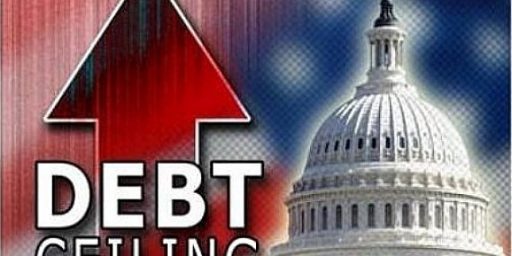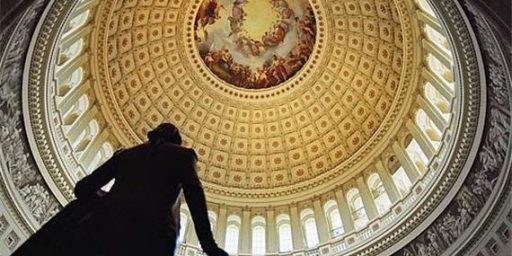Fitch: U.S. Credit Outlook ‘Negative’
One of the three major credit rating agencies has put the United States on negative credit watch:
Following the failure of the supercommittee, the U.S. government’s AAA credit rating was placed on a “negative outlook” Monday by Fitch Ratings, indicating a more than 50 percent chance the country gets slapped with another downgrade in the next two years.
“By postponing the difficult decisions on tax and spending until after forthcoming congressional and presidential elections, the scale and pace of required deficit reduction will consequently be greater,” Fitch said in a statement.
“Conversely, failure to reach agreement in 2013 on a credible deficit reduction plan and a worsening of the economic and fiscal outlook would likely result in a downgrade of the U.S. sovereign rating.”
Fitch for the time being didn’t change the triple A credit rating.
This isn’t entirely surprising. The August debt deal was just a temporary fix, and all we did was kick the can down the road. Honestly, though, I’m not among those who really considers the Super Committee a failure. It was absurd to think that a far reaching budget reform deal was going to be reached before the 2012 elections to begin with. The question is whether we’ll be able to reach one after the 2012 elections.






Dear Fitch,
The U.S. is an autonomous currency issuer, the monopoly supplier of the dollar. It cannot, by any stretch of the imagination, fail to obtain the necessary currency to meet its liabilities. The U.S. does not depend on taxation for revenue, nor does it need to issue debt to acquire funds. That a ratings agency which is supposedly tapped into the inner working of the banking and monetary systems is unaware of these facts is troubling, but it also helps explain why we’re in an economic mess: the people we pay to understand these things are instead blinded to the operational realities of a modern monetary system by politics and ideology.
I strongly recommend you try to catch up to the year 2012 along with the rest of us: we do not operate on a good standard and ceased to do so forty years ago. The thinking which applied to gold standard monetary theory does not apply to our current system, which is radically different.
If you have any questions contact me via Doug Mataconis, whom I’m sure would be more than willing to host a discussion via his blog, Outside the Beltway.
good = gold
People, like you, who think the printing press is the answer to our problems are incredibly foolish, in my opinion.
@Doug Mataconis: That you can say that means you understand neither my argument nor the system we have. You also continue thinking in terms of a non-existent gold standard which does not apply. If you have a question then ask, but your repeated attempts to mischaracterize my position wears thin.
@Ben Wolf:
I’m not making any reference to a gold standard but I suggest you do some reading about a phenomenon called inflation and what it can do to an economy. Then get back to me.
@Doug Mataconis: And there you go again, basing your arguments on assumptions. You assume I advocate printing endless supplies of money, despite at least a dozen comments I’ve made aimed at you in which I state inflation is the constraint on spending. How many more times do I have to write that? Try asking for once instead of thinking you understand my views which, no offense, are far better informed as to how our system functions than yours.
Doug, the snarky tone is unbecoming for the blog host.
The US can just print, then purchase their own debt with newly printed dollars. Nobody will know. Right?
@Doug Mataconis:
How can you have inflation during depressed demand? Oh yeah you can’t, that’s why the past few years look like they do.
@MG:
Firstly, no one is making this argument but you. Secondly, the government doesn’t need to repay anyone. It already owns all its debts because they consist entirely of bank reserves of which the Fed is the monopoly supplier. All the government does when it issues what can only loosely be called “debt” is transfer reserves to the government’s account at the Fed, which are then switched back once the bonds mature. It doesn’t spend any of it.
We have a budget deal — big automatic cuts — the Super Committee simply failed to replace it with a different one.